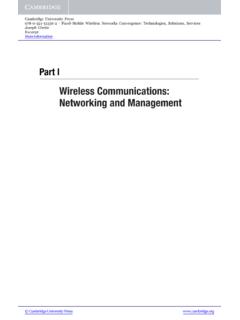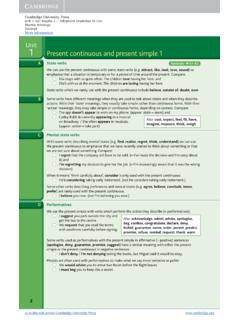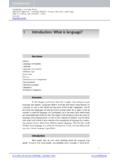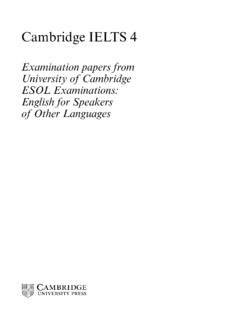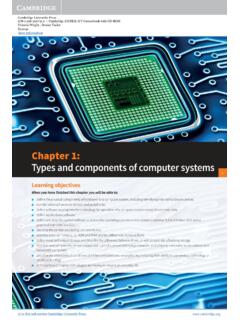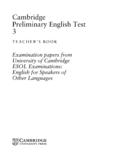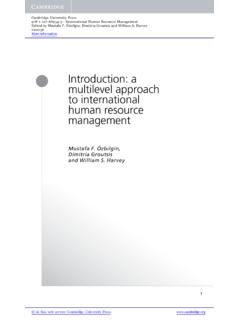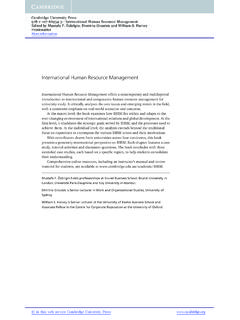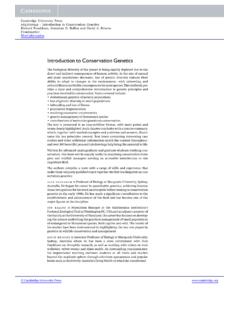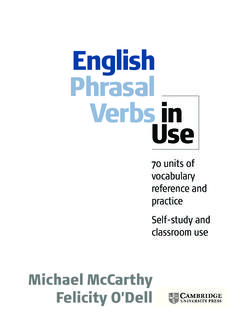Transcription of Part 1: Reading comprehension - Cambridge University Press
1 Cambridge University Press978-1-107-65194-4 Cambridge IGCSE First Language EnglishMarian CoxExcerptMore information in this web service Cambridge University IGCSE First Language English Cambridge University Press 2014 Part 1 Reading comprehensionUnit 1 Same differencePart 1: Reading comprehensionUnit 1: Same difference Topic outline Main skills: Reading for explicit meaning; Reading for implicit meaning; recognising writers effects Secondary skills: identifying facts; summary; informative writing; narrative writing; descriptive writing Outcome: informative piece; narrative extension; * short story Materials: informative non-fiction; narrative fiction; Worksheet for Text 1B plus answers Texts: Text 1A: Two of a kind; Text 1B: January the fifthLesson plan1 Ask students to give their reaction to the idea of identical twins, describe those they have known, say whether they would like to be one.
2 (5)2 Ask students to skim-read Text 1A. (5) 3 Ask students to work with a partner to re-read the text, identify the key points being careful not to confuse facts and opinions and make a list in their own words. (5)4 Collect feedback to write list of points on board. (5) 5 Ask students to scan Text 1A for examples of characteristics of informative writing, and to explain why this style is appropriate for this genre. (5) 6 Set task: Write a half-page summary of Text 1A on the topic of twins for an encyclopaedia entry, using and re-ordering the key points on the board and writing in the style of Text 1A. Collect pieces to assess for a) use of material (15 marks), and b) style and structure (5 marks). (15) 7 Choose four students to read the three speaking parts and the narration in Text 1B, which is the opening of a short story.
3 (5)8 Students work in pairs to complete the worksheet on Text 1B. (30)9 Go through the worksheet questions and discuss validity of answers offered or solicited. (15)Homework taskWrite a continuation and ending to the story to explain what happens at the tasksAsk students to plan, draft and write their own story with twins as the main characters, to include dialogue and descriptive and figurative language to create setting and in this web service Cambridge University Cambridge University Press 2014 Text 1 ACambridge IGCSE First Language English2 Reading comprehensionUnit 1 Same differenceTwo of a kindEveryone is fascinated by identical twins: they look the same even advanced digital imaging systems sometimes fail to tell them apart and yet they have different personalities and abilities. Literature and detective stories depend upon them for providing a plot twist or a mystery.
4 In reality, too, there have been numerous cases of one twin impersonating the other for a joke, to escape punishment or to advance a romantic interest. They may have the same eyes, the same hair colour, the same smile, but one will be shy and the other more outgoing, or one cleverer or funnier or kinder than the other. And this despite their having the same DNA. They do not, however, have the same fingerprints, which are believed to be determined by environmental factors. Twins like spending time with each other often to the exclusion of others. In fifty percent of cases, they even develop their own secret language. Furthermore, it is commonly believed that they have the ability to communicate telepathically so that, for instance, one is able to draw a picture of what the other is thinking. There have been innumerable claims that a twin has shared the physical or mental pain of the other known as crisis telepathy even when they could not have known it was happening.
5 Monozygotic twins who share everything before birth usually share everything after birth too: the same tastes in food, music, sport or politics .. One might think that this could be explained by the fact that parents often give their new-born twins confusingly similar names, continue to dress them exactly alike until they are well into their teens, and generally treat them in the same way throughout their upbringing. However, there are well-documented cases of identical twins brought up separately from birth who nonetheless made the same decisions and life choices. In the 1980s, there was the much-publicised case of the identical twin Jim brothers. Born in Ohio USA in 1939, Jim Springer and Jim Lewis were put up for adoption as babies and raised by different couples, who happened to give them the same first name.
6 When Jim Springer reconnected with his brother at age 39 in 1979, a string of other similarities and coincidences was discovered. Both men were six feet tall and weighed 180 pounds. Growing up, they d both had dogs named Toy and taken family vacations on the same beach in Florida. As young men, they d both married women named Linda, and then divorced them. Their second wives were both named Betty. They named their sons James Alan and James Allan. They d both served as part-time sheriffs, enjoyed home carpentry projects, and suffered from severe headaches. In August every year, thousands of twins descend on a town in Ohio called Twinsburg, named by identical twin brothers nearly two centuries ago. The Twins Days Festival is a three-day event consisting of talent shows and look-alike contests that has become one of the world s largest gatherings of twins.
7 There have also been other festivals in the UAE, Australia, France and Nigeria. The latter country has a large proportion of twins in its population: one in 22 births to the Yoruba people in Nigeria produces twins, identical or fraternal, which is a much higher incidence than anywhere else in the world. This has been attributed to the eating of yams, but the theory is disputed. Biomedical researchers descend on these events, regarding them as a precious opportunity to conduct surveys and experiments. Scientists study twins in order to collect evidence for the age-old nature versus nurture debate: how much of their behaviour is hereditary and how much conditioned by their environment; what are people actually born with and what is caused by experience? Because identical twins come from a single fertilized egg that splits in two, and share virtually the same genetic code, any differences between them must be due to environmental factors.
8 Studying the differences between identical twins to pinpoint the influence of environment, and comparing identical twins with fraternal ones to measure the role of inheritance, has been crucial to understanding the interplay of nature and nurture in determining our personalities, behaviour, and vulnerability to disease. in this web service Cambridge University IGCSE First Language English Cambridge University Press 2014 Text 1 BPart 1 Reading comprehensionUnit 1 Same differenceJanuary the fifthPeter Morton woke with a start to face the first light. Rain tapped against the glass. It was January the looked across a table on which a night-light had guttered into a pool of water, at the other bed. Francis Morton was still asleep, and Peter lay down again with his eyes on his brother. It amused him to imagine it was himself whom he watched, the same hair, the same eyes, the same lips and line of cheek.
9 But the thought palled, and the mind went back to the fact which lent the day importance. It was the fifth of January. He could hardly believe a year had passed since Mrs Henne-Falcon had given her last children s turned suddenly upon his back and threw an arm across his face, blocking his mouth. Peter s heart began to beat fast, not with pleasure now but with uneasiness. He sat up and called across the table, Wake up. Francis s shoulders shook and he waved a clenched fist in the air, but his eyes remained closed. To Peter Morton the whole room seemed to darken and he had the impression of a great bird swooping. He cried again, Wake up, and once more there was silver light and the touch of rain on the rubbed his eyes. Did you call out? he asked. You are having a bad dream, Peter said. Already experience had taught him how far their minds reflected each other.
10 But he was the elder, by a matter of minutes, and that brief extra interval of light, while his brother still struggled in pain and darkness, had given him self-reliance and an instinct of protection towards the other who was afraid of so many things. I dreamed that I was dead, Francis said. What was it like? Peter asked. I can t remember, Francis said. You dreamed of a big bird. Did I? The two lay silent in bed facing each other, the same green eyes, the same nose tilting at the tip, the same firm lips, and the same premature modelling of the chin. The fifth of January, Peter thought again, his mind drifting idly from the image of cakes to the prizes which might be won. Egg-and-spoon races, spearing apples in basins of water, blind man s buff. I don t want to go, Francis said suddenly. I suppose Joyce will be there.
